#guides and references
Explore tagged Tumblr posts
Note
Hi, sorry to interrupt, but I was looking at your fics, which are really good, and I came across something that I see in a lot of other fanfics and I don't know how to do it. How did you manage to set it indented?
hello! thank you for reading my fics, it means a lot!
I need to know what you mean by "indented." do you mean something like this summary?
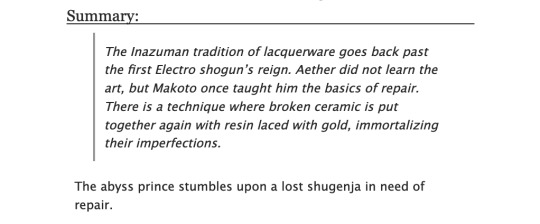
tumblr editor calls this "indented" for some reason, but what it's really called are "blockquotes." you don't need fancy css for this since it's available with just html. you can code it using the blockquote tag.


on the other hand, maybe you mean indenting as in adding spacing like in this chat?
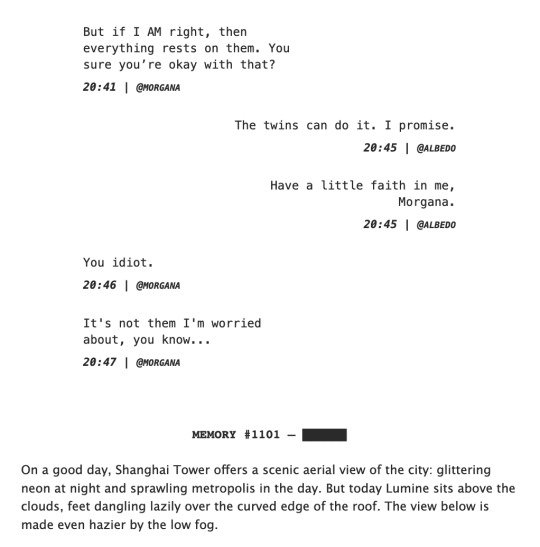
in this case, then yes you do need to add css to your workskin. here are the relevant parts of the code.
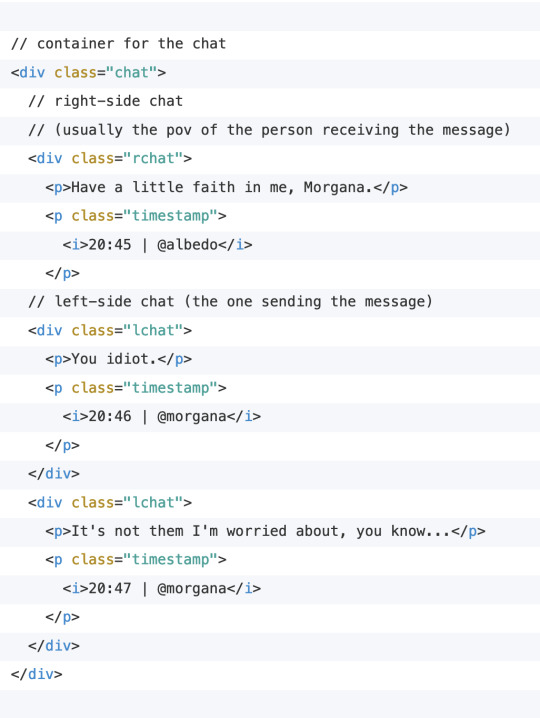
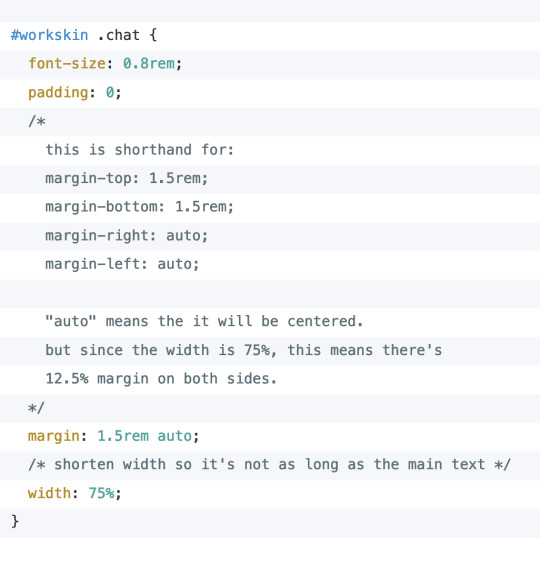
so the important things here are:
put your elements inside a container with the .chat class (or any other class name of your choosing)
make sure .chat has margin set to auto and width set to less than 100%.
I hope I was able to answer your question! I'm not sure if there are other examples of indenting that I used in fics; if you meant something else, just let me know so I can answer the question properly! 🙇🏻
the rest of my workskin code is always available to use as a reference (copy paste if you want): AO3 demo, html code, css code.
something extra under the cut:
bonus:
the above is a modified version of what I'm doing. I actually combined both methods in one, but that gets a little bit more complicated and it's probably more than what you need. I'll add the full code here under the cut if anyone's interested.

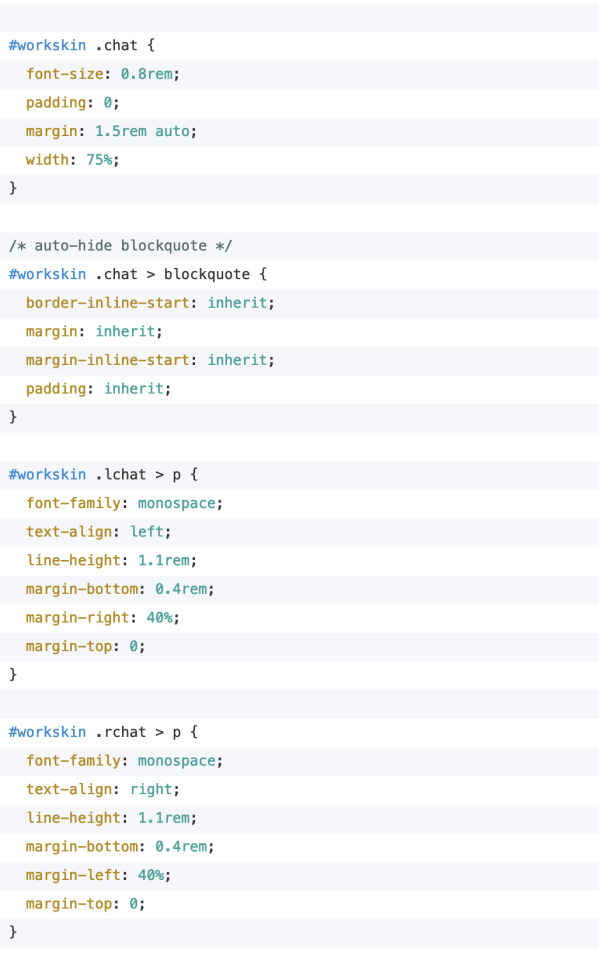
to note:
notice that I replaced the div containers with blockquote in the html. however, with workskins turned on, you won't see it! that's because I'm hiding it specifically when workskin is turned on.
but if someone reads my fic with workskins turned off (the "hide creator's style" button AO3 provides at the top of the fic), then none of my styling will show up. I still want to make the grouping of the chat text and timestamp clear though, so I put them in blockquotes for this purpose.
here's how it looks like with and without workskins. I want to make sure that my fics are readable even if someone turns off workskins, or if they download my fic as an epub/pdf (which IIRC removes all the css styling as well).
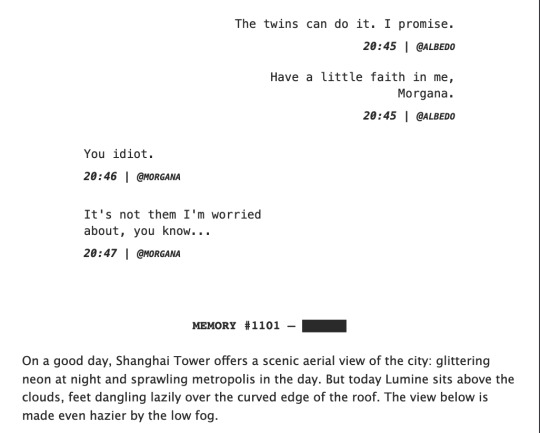
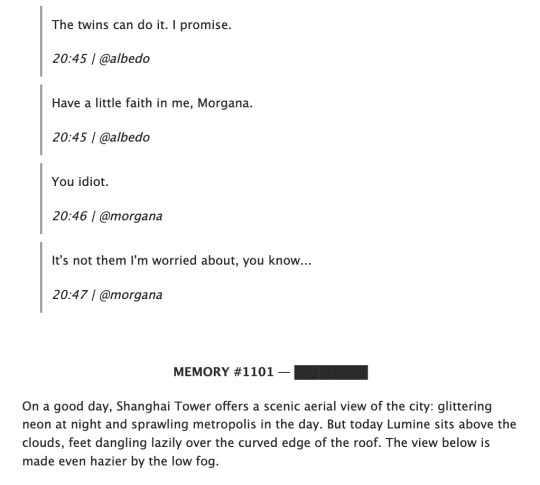
11 notes
·
View notes
Text
Other Words for "Look" + With meanings | List for writers
Many people create lists of synonyms for the word 'said,' but what about the word 'look'? Here are some synonyms that I enjoy using in my writing, along with their meanings for your reference. While all these words relate to 'look,' they each carry distinct meanings and nuances, so I thought it would be helpful to provide meanings for each one.
Gaze - To look steadily and intently, especially in admiration or thought.
Glance - A brief or hurried look.
Peek - A quick and typically secretive look.
Peer - To look with difficulty or concentration.
Scan - To look over quickly but thoroughly.
Observe - To watch carefully and attentively.
Inspect - To look at closely in order to assess condition or quality.
Stare - To look fixedly or vacantly at someone or something.
Glimpse - To see or perceive briefly or partially.
Eye - To look or stare at intently.
Peruse - To read or examine something with great care.
Scrutinize - To examine or inspect closely and thoroughly.
Behold - To see or observe a thing or person, especially a remarkable one.
Witness - To see something happen, typically a significant event.
Spot - To see, notice, or recognize someone or something.
Contemplate - To look thoughtfully for a long time at.
Sight - To suddenly or unexpectedly see something or someone.
Ogle - To stare at in a lecherous manner.
Leer - To look or gaze in an unpleasant, malicious way.
Gawk - To stare openly and stupidly.
Gape - To stare with one's mouth open wide, in amazement.
Squint - To look with eyes partially closed.
Regard - To consider or think of in a specified way.
Admire - To regard with pleasure, wonder, and approval.
Skim - To look through quickly to gain superficial knowledge.
Reconnoiter - To make a military observation of a region.
Flick - To look or move the eyes quickly.
Rake - To look through something rapidly and unsystematically.
Glare - To look angrily or fiercely.
Peep - To look quickly and secretly through an opening.
Focus - To concentrate one's visual effort on.
Discover - To find or realize something not clear before.
Spot-check - To examine something briefly or at random.
Devour - To look over with eager enthusiasm.
Examine - To inspect in detail to determine condition.
Feast one's eyes - To look at something with great enjoyment.
Catch sight of - To suddenly or unexpectedly see.
Clap eyes on - To suddenly see someone or something.
Set eyes on - To look at, especially for the first time.
Take a dekko - Colloquial for taking a look.
Leer at - To look or gaze in a suggestive manner.
Rubberneck - To stare at something in a foolish way.
Make out - To manage to see or read with difficulty.
Lay eyes on - To see or look at.
Pore over - To look at or read something intently.
Ogle at - To look at in a lecherous or predatory way.
Pry - To look or inquire into something in a determined manner.
Dart - To look quickly or furtively.
Drink in - To look at with great enjoyment or fascination.
Bask in - To look at or enjoy something for a period of time.
#on writing#creative writing#writing#writing tips#writers block#how to write#thewriteadviceforwriters#writeblr#writers and poets#writers on tumblr#novel writing#fiction writing#romance writing#writing advice#writing blog#writing characters#writing community#writing help#writing ideas#writing inspiration#writing guide#writing prompts#writing a book#writing resources#writing reference#writing tips and tricks#writers#writing tools#writing life#writing software
14K notes
·
View notes
Text
Creating Emotionally Devastating Scenes.
Crafting a scene that earns the total sympathy of your readers can be challenging, but it's not impossible. Most emotionally devastating scenes fail at two things, but when these are done right, the results can be powerful.
⚪ The Important Concepts for Writing an Emotionally Devastating Scene
1. The Build-Up,
2. Breaking the Dam.
Before I explain these concepts, let me share a case study.
⚫ Case Study
I wrote a story about a young orphan named Jackie and her younger brother. Their village was burned down, leaving them as the only survivors.
For the next few chapters, readers followed their painful journey and their struggle to survive. The younger brother had a heart problem, and Jackie vowed to become a cardiologist to save him.
She was very ambitious about it, but at the time, it was very ironic. Later in the story, when they encountered a tragic living condition with a family, the brother died while telling his sister how much he missed their parents.
When her brother was fighting for his life, she was sent out of the room, only to be let in again to see his cold, lifeless body.
⚪ Explanation of Concepts
1. The Build-Up
The build-up is extremely important when you aim to convey strong emotions. Here's a secret: if you plan for a scene with strong emotions, start leaving breadcrumbs from the very beginning of the story.
Take the previous case study. I carefully built up their journey so people could easily relate and feel the pain of the older sister during her brother's sudden death.
You need to give the situation enough reason to feel utterly hopeless and devastating. Gradually cultivate the tension until it's ready to let loose.
⚫ Understanding the Use of Breadcrumbs.
Breadcrumbs in stories ensure you utilize the time you have to build up certain emotions around your characters.
At the beginning of my story, Jackie’s fate was already pitiable, but she survived every hurdle. This gave the readers enough to feel for her while still leaning away from the outcome. When I built enough, I introduced her brother's sudden death.
Hence, leave your breadcrumbs while leaning away from the outcome.
⚪ How to Properly Leave Breadcrumbs
When building up your story, consider these elements:
☞ Character Relatability: The characters need to be realistic to draw readers into the story. This helps readers invest themselves in your story.
☞ Realistic Emotional Pain: Just as characters need to be relatable, their emotions need to be realistic and not appear forced.
☞ Create a Strong Emotional Attachment: Give them something they care about or that has the power to ruin their lives in any way. It could be something that makes them happy or something their happiness relies on. When it's time, snatch it away without remorse.
☞ Have a Backstage Struggle: This struggle keeps readers occupied, so they won't see the outcome coming. For example, Jackie’s constant struggle to find food and shelter keeps readers engaged while the impending tragedy looms in the background.
☞ Attach Believable Elements: For a realistic character, emotion, and struggle, attach believable elements. It could be death, ailments, sickness, disorder, disappointment, failure, etc.
Now that we've covered the build-up, let's move on to the next crucial part.
2. Breaking the Dam
This is when you make your readers feel the strong emotions alongside your characters. All the tension you’ve been building up is released, making all emotions come into play.
☞ Break Your Strong Attachment: Cut off your strong attachment from your character when they least expect it or at a point when they couldn't use more struggles (i.e when they are helpless).
This will not only evoke readers’ emotions but also pique their curiosity as they wonder how the character will survive the situation.
☞ Description of Sensory Details to Invoke Emotions: The advice of "show, don't tell" will be really helpful here. It's crucial to ensure that the final execution matches the build-up.
A well-crafted build-up can fall flat if the emotional release isn't handled effectively. To avoid this, blend the climax seamlessly into the narrative, making it feel natural and impactful.
Reblog to save for reference! 💜
#writing#writeblr#writers on tumblr#writer#writers and poets#writerscommunity#writing community#wattpad#ao3 writer#a03 writer#writers of tumblr#aspiring author#aspiring writer#writing advice#writing blog#creative writing#writing discussion#writing encouragement#writing guide#writing help#writing ideas#writing journey#writing life#writing motivation#writing novels#writing on ao3#writing process#writing resources#writing reference#writing requests
2K notes
·
View notes
Text
Fantasy Guide to Building A Culture

Culture is defined by a collection of morals, ethics, traditions, customs and behaviours shared by a group of people.
Hierarchy and Social Structures

Within every culture, there is a hierarchy. Hierarchies are an important part of any culture, usually do ingrained that one within the culture wouldn't even question it. Hierarchy can be established either by age, gender or wealth and could even determine roles within their society. Sometimes hierarchy can may be oppressive and rigid whilst other times, ranks can intermingle without trouble. You should consider how these different ranks interact with one another and whether there are any special gestures or acts of deference one must pay to those higher than them. For example, the Khasi people of Meghalaya (Northern India), are strictly matrillineal. Women run the households, inheritance runs through the female line, and the men of the culture typically defer to their mothers and wives. Here are a few questions to consider:
How is a leader determined within the culture as a whole and the family unit?
Is the culture matriarchal? Patriarchal? Or does gender even matter?
How would one recognise the different ranks?
How would one act around somebody higher ranking? How would somebody he expected to act around somebody lower ranking?
Can one move socially? If not, why? If so, how?
Traditions and Customs

Traditions are a staple in any culture. These can be gestures or living life a certain way or to the way a certain person should look. Traditions are a personal detail to culture, they are what make it important. Tradition can dictate how one should keep their home, run their family, take care of their appearance, act in public and even determine relationship. Tradition can also be a double edged sword. Traditions can also be restrictive and allow a culture to push away a former member if they do not adhere to them, eg Traditional expectations of chastity led to thousands of Irish women being imprisoned at the Magdelene Laundries. Customs could be anything from how one treats another, to how they greet someone.
How important is tradition?
What are some rituals your culture undertakes?
What are some traditional values in your world? Does it effect daily life?
Are there any traditions that determine one's status?
Values and Opinions
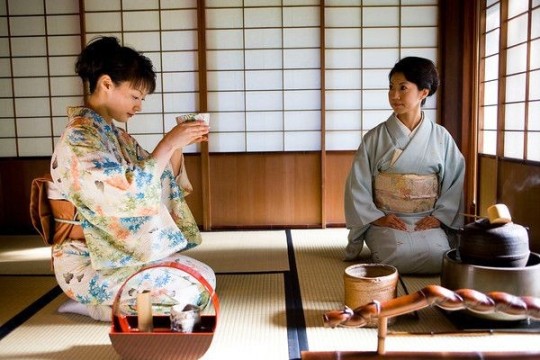
Values and Opinions are the bread and butter of any culture. This is the way your culture sees the world and how they approach different life hurdles. These may differ with other cultures and be considered odd to outsiders, what one culture may value another may not and what opinion another holds, one may not. There will be historical and traditional reasons to why these values and opinions are held. Cultures usually have a paragon to which they hold their members to, a list of characteristics that they expect one to if not adhere to then aspire to. The Yoruba people value honesty, hard work, courage and integrity. Here are some questions to consider?
How important are these ethics and core values? Could somebody be ostracised for not living up to them?
What are some morals that clash with other cultures?
What does your culture precieved to be right? Or wrong?
What are some opinions that are considered to be taboo in your culture? Why?
Dress Code

For many cultures, the way somebody dresses can be important. History and ethics can effect how one is meant to be dressed such as an expectation of chastity, can impose strict modesty. While other cultures, put more importance on details, the different sorts of clothes worn and when or what colour one might wear. The Palestinian people (من النهر إلى البحر ، قد يكونون أحرارا) denoted different family ties, marriage status and wealth by the embroidery and detailing on their thoub.
Are there traditional clothes for your world? Are they something somebody wears on a daily basis or just on occasion?
Are there any rules around what people can wear?
What would be considered formal dress? Casual dress?
What would happen if somebody wore the wrong clothes to an event?
Language

Language can also be ingrained as part of a Culture. It can be a specific way one speaks or a an entirely different language. For example, in the Southern States of America, one can engage in a sort of double talk, saying something that sounds sweet whilst delivering something pointed. Bless their heart. I have a post on creating your own language here.
Arts, Music and Craft

Many cultures are known for different styles of dance, their artwork and crafts. Art is a great part of culture, a way for people to express themselves and their culture in art form. Dance can be an integral part of culture, such as céilí dance in Ireland or the Polka in the Czech Republic. Handicrafts could also be important in culture, such as knitting in Scottish culture and Hebron glass in Palestine. Music is also close to culture, from traditional kinds of singing such as the White Voice in Ukraine and the playing of certain instruments such as the mvet.
Food and Diet

The way a culture prepares or intakes or treats certain foods are important to a culture. In some cultures, there is a diet yo adhere to, certain foods are completely banned. With Jewish culture, pork is prohibited along with fish such as sturgeon, along with shellfish and certain fowl. Meat must also be prepared in a certain way and animal byproducts such as dairy, must never be created or even eaten around this meat. This is known as kosher. The way one consumes food is also important to culture. In some cultures, only certain people may eat together. Some cultures place important on how food is eaten. In Nigerian culture, the oldest guests are served first usually the men before the women. In Japanese culture, one must say 'itadakimasu' (I recieve) before eating. Culture may also include fasting, periods of time one doesn't intake food for a specific reason.
What are some traditional dishes in your world?
What would be a basic diet for the common man?
What's considered a delicacy?
Is there a societal difference in diet? What are the factors that effect diet between classes?
Is there any influence from other cuisines? If not, why not? If so, to what extent?
What would a typical breakfast contain?
What meals are served during the day?
What's considered a comfort food or drink?
Are there any restrictions on who can eat what or when?
Are there any banned foods?
What stance does your world take on alcohol? Is it legal? Can anybody consume it?
Are there any dining customs? Are traditions?
Is there a difference in formal meals or casual meals? If so, what's involved?
Are there any gestures or actions unacceptable at the dinner table?
How are guests treated at meals? If they are given deference, how so?
#Fantasy Guide to Building A Culture#As promised#If I fail my German exam I'm blaming ye#Culture#Building a culture#Fantasy Guide#WorldBuilding#WorldBuilding guide#WorldBuilding help#Writing help#writing#writeblr#writing resources#writing reference#writing advice#ask answered questions#writers#writing advice writing resources#spilled ink#ask answered
11K notes
·
View notes
Text

A happy Matt is a suspicious Matt
#mattfoggy#matt murdock#foggy nelson#matt x foggy#daredevil#this is actually just a sketch i colored because i had no internet and was bored#a part of me is always thinking about them...#matt may not need to be guided#but he still needs his foggy okay?#also like i said no internet so no references#it was me and my memories from when i watched this show in 2018 against the world#drawing old ships is fun... should do more of that
1K notes
·
View notes
Text
Where to Start Your Research When Writing a Disabled Character
[large text: Where to Start Your Research When Writing a Disabled Character]
So you have decided that you want to make a disabled character! Awesome. But what's next? What information should you decide on at the early phrase of making the character?
This post will only talk about the disability part of the character creation process. Obviously, a disabled character needs a personality, interests, and backstory as every other one. But by including their disability early in the process, you can actually get it to have a deeper effect on the character - disability shouldn't be their whole life, but it should impact it. That's what disabilities do.
If you don't know what disability you would want to give them in the first place;
[large text: If you don't know what disability you would want to give them in the first place;]
Start broad. Is it sensory, mobility related, cognitive, developmental, autoimmune, neurodegenerative; maybe multiple of these, or maybe something else completely? Pick one and see what disabilities it encompasses; see if anything works for your character. Or...
If you have a specific symptom or aid in mind, see what could cause them. Don't assume or guess; not every wheelchair user is vaguely paralyzed below the waist with no other symptoms, not everyone with extensive scarring got it via physical trauma. Or...
Consider which disabilities are common in real life. Cerebral palsy, muscular dystrophy, stroke, cataracts, diabetes, intellectual disability, neuropathy, multiple sclerosis, epilepsy, thyroid disorders, autism, dwarfism, arthritis, cancers, brain damage, just to name a few.
Decide what specific type of condition they will have. If you're thinking about them having albinism, will it be ocular, oculocutaneous, or one of the rare syndrome-types? If you want to give them spinal muscular atrophy, which of the many possible onsets will they have? If they have Ehlers-Danlos Syndrome, which one out of the 13 different types do they have? Is their amputation below, or above the knee (it's a major difference)? Not all conditions will have subtypes, but it's worth looking into to not be surprised later. This will help you with further research.
If you're really struggling with figuring out what exact disability would make sense for your character, you can send an ask. Just make sure that you have tried the above and put actual specifics in your ask to give us something to work with. You can also check out our "disabled character ideas" tag.
Here are some ideas for a character using crutches.
Here are some ideas for a character with a facial difference (obligatory link: what is a facial difference?).
If you already know what disability your character is going to have;
[large text: If you already know what disability your character is going to have;]
Start by reading about the onset and cause of the condition. It could be acquired, congenital, progressive, potentially multiple of these. They could be caused by an illness, trauma, or something else entirely. Is your character a congenital amputee, or is it acquired? If acquired - how recently? Has it been a week, or 10 years? What caused them to become disabled - did they have meningitis, or was it an accident? Again, check what your options are - there are going to be more diverse than you expect.
Read about the symptoms. Do not assume or guess what they are. You will almost definitely discover something new. Example: a lot of people making a character with albinism don't realize that it has other symptoms than just lack of melanin, like nystagmus, visual impairment, and photophobia. Decide what your character experiences, to what degree, how frequently, and what do they do (or don't do) to deal with it.
Don't give your character only the most "acceptable" symptoms of their disability and ignore everything else. Example: many writers will omit the topic of incontinence in their para- and tetraplegic characters, even though it's extremely common. Don't shy away from aspects of disability that aren't romanticized.
Don't just... make them abled "because magic". If they're Deaf, don't give them some ability that will make them into an essentially hearing person. Don't give your blind character some "cheat" so that they can see, give them a cane. Don't give an amputee prosthetics that work better than meat limbs. To have a disabled character you need to have a character that's actually disabled. There's no way around it.
Think about complications your character could experience within the story. If your character wears their prosthetic a lot, they might start to experience skin breakdown or pain. Someone who uses a wheelchair a lot has a risk of pressure sores. Glowing and Flickering Fantasy Item might cause problems for someone photophobic or photosensitive. What do they do when that happens, or how do they prevent that from happening?
Look out for comorbidities. It's rare for disabled people to only have one medical condition and nothing else. Disabilities like to show up in pairs. Or dozens.
If relevant, consider mobility aids, assistive devices, and disability aids. Wheelchairs, canes, rollators, braces, AAC, walkers, nasal cannulas, crutches, white canes, feeding tubes, braillers, ostomy bags, insulin pumps, service dogs, trach tubes, hearing aids, orthoses, splints... the list is basically endless, and there's a lot of everyday things that might count as a disability aid as well - even just a hat could be one for someone whose disability requires them to stay out of the sun. Make sure that it's actually based on symptoms, not just your assumptions - most blind people don't wear sunglasses, not all people with SCI use a wheelchair, upper limb prosthetics aren't nearly as useful as you think. Decide which ones your character could have, how often they would use them, and if they switch between different aids.
Basically all of the above aids will have subtypes or variants. There is a lot of options. Does your character use an active manual wheelchair, a powerchair, or a generic hospital wheelchair? Are they using high-, or low-tech AAC? What would be available to them? Does it change over the course of their story, or their life in general?
If relevant, think about what treatment your character might receive. Do they need medication? Physical therapy? Occupational therapy? Orientation and mobility training? Speech therapy? Do they have access to it, and why or why not?
What is your character's support system? Do they have a carer; if yes, then what do they help your character with and what kind of relationship do they have? Is your character happy about it or not at all?
How did their life change after becoming disabled? If your character goes from being an extreme athlete to suddenly being a full-time wheelchair user, it will have an effect - are they going to stop doing sports at all, are they going to just do extreme wheelchair sports now, or are they going to try out wheelchair table tennis instead? Do they know and respect their new limitations? Did they have to get a different job or had to make their house accessible? Do they have support in this transition, or are they on their own - do they wish they had that support?
What about *other* characters? Your character isn't going to be the only disabled person in existence. Do they know other disabled people? Do they have a community? If your character manages their disability with something that's only available to them, what about all the other people with the same disability?
What is the society that your character lives in like? Is the architecture accessible? How do they treat disabled people? Are abled characters knowledgeable about disabilities? How many people speak the local sign language(s)? Are accessible bathrooms common, or does your character have to go home every few hours? Is there access to prosthetists and ocularists, or what do they do when their prosthetic leg or eye requires the routine check-up?
Know the tropes. If a burn survivor character is an evil mask-wearer, if a powerchair user is a constantly rude and ungrateful to everyone villain, if an amputee is a genius mechanic who fixes their own prosthetics, you have A Trope. Not all tropes are made equal; some are actively harmful to real people, while others are just annoying or boring by the nature of having been done to death. During the character creation process, research what tropes might apply and just try to trace your logic. Does your blind character see the future because it's a common superpower in their world, or are you doing the ancient "Blind Seer" trope?
Remember, that not all of the above questions will come up in your writing, but to know which ones won't you need to know the answers to them first. Even if you don't decide to explicitly name your character's condition, you will be aware of what they might function like. You will be able to add more depth to your character if you decide that they have T6 spina bifida, rather than if you made them into an ambiguous wheelchair user with ambiguous symptoms and ambiguous needs. Embrace research as part of your process and your characters will be better representation, sure, but they will also make more sense and seem more like actual people; same with the world that they are a part of.
This post exists to help you establish the basics of your character's disability so that you can do research on your own and answer some of the most common ("what are symptoms of x?") questions by yourself. If you have these things already established, it will also be easier for us to answer any possible questions you might have - e.g. "what would a character with complete high-level paraplegia do in a world where the modern kind of wheelchair has not been invented yet?" is more concise than just "how do I write a character with paralysis?" - I think it's more helpful for askers as well; a vague answer won't be of much help.
I hope that this post is helpful,
mod Sasza
#mod sasza#writing reference#writing advice#writing resources#writeblr#writing disabled characters#writing resource#long post#writing tips#writing guide
3K notes
·
View notes
Text
Husk Drawing Guide
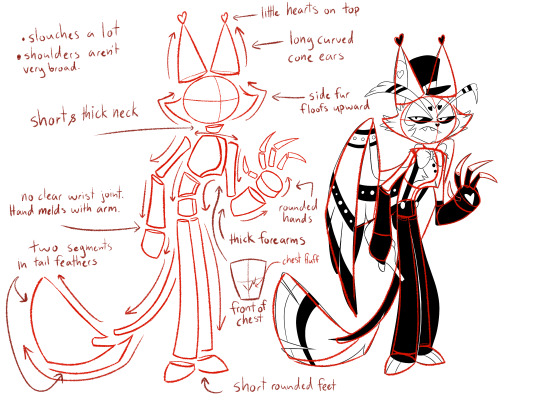


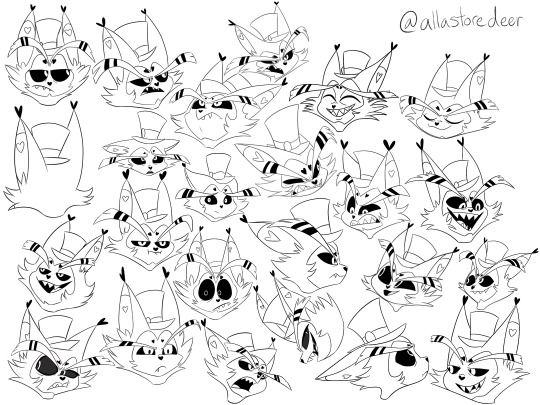
Husk drawing Guide
May have to click for better quality
Link to Masterpost for my other drawing guides
#hazbin hotel husk#hazbin hotel#hazbin husk#husker#drawing guide#husk drawing guide#my art#my drawing references
1K notes
·
View notes
Text


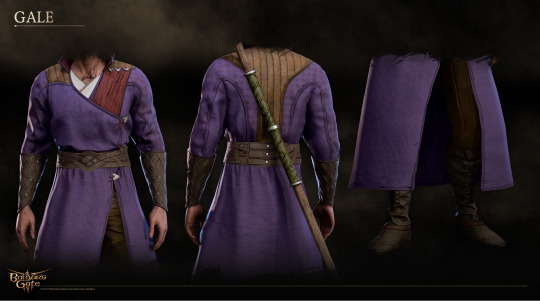




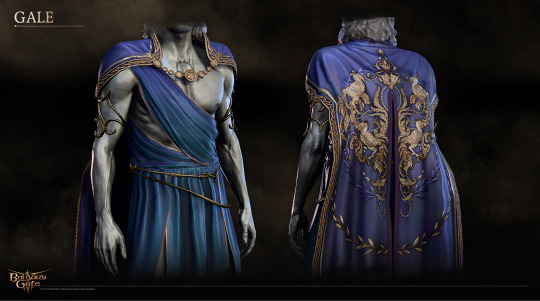

gale dekarios + cosplay guide
(click on the images for a bigger version)
#gale dekarios#gale of waterdeep#baldur's gate 3#bg3#baldurs gate 3#cosplay reference#cosplay guide#ch: gale dekarios#vg: baldur's gate 3#series: baldur's gate#misc: reference#misc: resources#i found this completely by accident and it's such a wonderful resource whether you're an artist writer or cosplayer tbh
664 notes
·
View notes
Text
Beating the Heat while Fat: A Summer Survival Guide
Summer is (almost) here and it’s going to be hotter than ever. If you’re fat (like me), you know how much hot weather sucks. Specifically, we get to deal with fun issues like underboob sweat, chub rub, skin fold sunburn, and more. And while I like to take a body neutral approach to everything, this can be hard in summer thanks to exclusion and neglect.
The thing is that not a lot of people really... talk about these things, though, because that would interfere with our image of summer. Not a lot of companies are marketing their stuff as a solution to fat people’s problems, because that would be acknowledging that fat people might actually want to go outside during summer.
Having been fat for many a summer now, I want to share some of my resources for enjoying summer! These are all based on personal recommendations and things I have directly experienced. Please feel free to reblog and add on with your experiences and recommendations!
However, if your commentary is even remotely fatphobic, you will be blocked and your comments will be deleted. This post is not for you, and nobody is actually interested in what you have to say!
Back and Underboob Sweat
Two words: Gold Bond. Gold Bond fixes this. It comes in powder, stick, and spray form. I’ve used the powder in shoes, but not on my body. They’ve recently released an invisible form of the spray, which I’m very excited about.
Spray this under your breast tissue or other skin folds, or on flat areas of skin like your lower back that tend to sweat. Some of their powders have aloe in them, which is delightfully soothing for the skin.
Make sure that if you’re sensitive to scent, you buy one of the unscented versions. The “fresh” scent is nice, but it is a scent!
When you’re using this type of spray, do it clean but dry. Don’t do it right after a shower- give your skin a chance to dry off. Lift your breast or skin fold, spray underneath, and then hold it for a couple of seconds to let the spray dry down.
You can also use other types of powder, like body powder or baby powder. There’s mixed evidence about talc-containing powder and its link to cancer, but some people do find talcum powder more irritating than talc-free powder, so whether or not you use this is up to you.
Do keep in mind that this is NOT sunscreen! Apply your sunscreen first for areas of exposed skin.
Chub Rub
Dealing with the tops of your thighs rubbing together is extremely unfun. There are a couple of ways I like to deal with this!
Slip Shorts
I actually reviewed a bunch of these a few years ago. Slip shorts or bike shorts are perfect for wearing under dresses or loose-fitting rompers as a way to stop your thighs from rubbing. As a bonus, if you’re using bike shorts, sometimes they come with extra pockets to stash stuff in.
Friction Sticks
If you’re wearing a swimsuit and don’t want to wear shorts, or just don’t want to wear shorts, period, then a friction stick is another good way to avoid chub rub! I have a couple, Bodyglide and Gold Bond.
If you’re buying Bodyglide, they have one that’s just as good, Bodyglide Outdoor, that is sometimes cheaper. There’s a Bodyglide “For Her” which I’ve never tried, but that’s usually more expensive and let’s be real, do you really need to moisturize your inner thighs? I think not!
There’s also creams you can use but I find those messy and less effective than the sticks. You might like them, though! Experiment with products to find the one(s) that work for you.
Friction sticks can also stop foot blisters. Rub a little on your heel, toe, or wherever you get hot spots.
Dealing With Sweat
I sweat, you sweat, we all sweat. Humans were meant to sweat. Sweating’s a good thing. But that doesn’t mean it’s fun, and frankly I hate being sweaty. Typically, fat people sweat more than thin people, for several reasons related to the way we thermoregulate.
Fortunately, there are lots of ways to make summer sweating less annoying. I’ve written about this before, so you can check out that post for some of my favorite tips for dealing with sweat. Here’s some of the highlights.
Evaporative Cooling
A bandanna or other wrap filled with water crystals can do AMAZING things. You can make this yourself really easily- if you can’t find water crystals, you can just use Orbeez. They sell little 99 cent packs of those in the checkout lines at some stores and at the dollar store, and you can make several cooling wraps with one packet.
You can also get evaporative cooling towels, like Frogg Toggs. I don’t like those as much because they tend to start smelling a little funny, but they’re great for larger area coverage.
Using these will help cool you down and will do the same thing that sweat does– without being sticky.
Hair
If you have long hair, get it off the back of your neck. I used to put it up in a bun with a bun former, but now I just use claw clips. They’re cuter and easier! Seriously, this will help you so much. Get the hair up and away from your skin, you’ll feel so much better.
Hand Fans
I always have a hand fan with me, but not one of the little battery operated ones. I’ve tried a lot of those! I even took one up a mountain once, and it was the only reason I survived. But they never provide the same level of breeze that my folding fan does.
I use this one because it’s cute, and you can get cute ones for a couple bucks on Amazon. I do prefer fabric to the stiff paper ones, just because they’re a bit more durable- I’ve had mine for years now. It’s good.
I’m also not a huge fan of those fans that go around your neck, but I’ve seen many people enjoying them. If they work for you, great!
Hydration and Electrolytes
Carry water with you when you go places, and if you’re gonna be out for a while doing anything strenuous, take some electrolyte tablets with you. I like Nuun because I think they taste good, but there’s lots of brands out there.
There’s no one mineral called electrolyte, just so you know. Electrolytes are a group of minerals that includes sodium, potassium, and chloride as the primary (or significant) electrolytes. Electrolytes are important because they have a natural positive or negative electrical charge when dissolved in water. This electricity is how your nerves transmit information and how your cells make your muscles contract, so low levels of electrolytes can cause some serious issues. Different electrolyte imbalances have different symptoms, but common symptoms include nausea, fatigue, confusion, tremors, muscle spasms (cramps), and dizziness.
If you’re feeling those as you’re moving around outside, get somewhere cool, drink some water, and either eat some food or add electrolyte tablets to your water. This will help stabilize you quickly!
Skin Fold Sunburn Prevention
Everybody should wear sunscreen, period. End of story.
But if you’re applying sunscreen by yourself and you have skin folds, it can be a pain to reach them! This is especially true for any folds that form on your upper back or around your upper arm.
These areas can burn and be very painful, especially if you’re in swimwear or a sleeveless top. It’s also VERY easy to forget that these areas need sunscreen!
If you don’t want or don’t have someone to help you apply those areas you can’t reach, spray sunscreen can be a way to get those areas. If you don’t like the spray or want heavier coverage with a cream, then use a lotion applicator!
If the stick style doesn’t work for you (like if you have shoulder mobility issues), the strap style asks for a different range of motion. If you can’t find one that works for you at a big box store, look at a pharmacy. These are often sold as disability aids or for elderly people with a reduced range of motion.
But honestly, one of the most important things about this is just knowing your body. Know where your skin folds are and think about how they move as you’re applying sunscreen. Get underneath them- as you move, those areas can be exposed to the sun, too.
So yeah, that’s my best advice for beating the heat while fat. If you’ve got other tips, feel free to share them!
#summer#body neutrality#i do not know how to tag this#also please don't complain about the length of the post#it's a reference guide a tldr would be meaningless
8K notes
·
View notes
Text

I’m realizing I never posted this guy on his own
I need you all to appreciate him
#he is so small#all he knows is dance#sundrop#fnaf sun#fnaf daycare attendant#my art#the original dance is the spooky scary skeleton one#and I used a guide thing for reference#I’ll link it later when I have more spoons#my animations
605 notes
·
View notes
Note
Hello! I hope I don't bother you again. I have two questions for you (I think there are more). I'm writing a zosan fanfic and I came up with the idea of putting "titles" in what happens in the "chapters" separated by the divider, like the titles of anime episodes (very One Piece with spoilers about what happens in the episode), I would like to know what do you think of this idea? I have images of what these titles would look like if you want them for better visualization. 2- Is there a skin work on ao3 that imitates these "titles", as if they were chapter titles of a book (but without having to have several chapters as I want to make a oneshot)?
hello! yes, I think that sounds like a neat idea. you should go for it!!
I don't watch one piece so I hope I'm visualizing it right. if I got it wrong, feel free to send me a picture.
anyway. are you trying to do something like this?
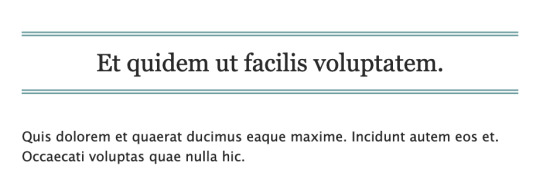
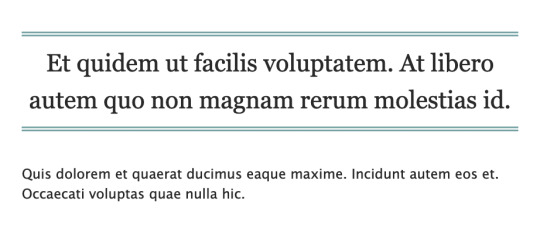
if this is what you're going for, you can try this code out! I also created a pastebin for this one, so you can just copy paste to your own workskin.

so here, we're creating the lined-title css class. you can just add it to your <p> tags in the html when you want to apply them. e.g.
<p class="lined-title">TITLE</p>
feel free to play around with border-style and the border-color (or any other attribute). you'll want border-style:solid if you just want one single line, for example.
you can also check AO3's FAQ on what colors and fonts you can use. fun fact: border-style:double is the same css they use to add those double lines in the FAQ!
note that this will span the entire width of the page. so if you have a short title, it'll look like this on desktop:

if you don't want it to span the whole page, we could try this instead (also included in the pastebin link):

which will result in this:

however, we can't manipulate the spacing between the text and the lines in this one. on the other hand, it has text-decoration-style:wavy which the first option doesn't have!
for custom scene dividers, you can also check out these guides:
How to Make Customized Page Dividers by La_Temperanza
Dividers & how to style them by skinofthesoul
Rainbow Paragraph Divider by benwvatt
bonus: inspect element
also, are you familiar with inspect element yet? if you are, great! you can just skip this. otherwise, if you're still getting the hang of working with workskins and aren't used to editing css, you can try this:
right click on the text you want to change on AO3, then click "inspect" or "inspect element" (not sure what it's called in browsers these days; on firefox, it's just "inspect"). this will bring up a bunch of developer tools and it kinda looks like this:
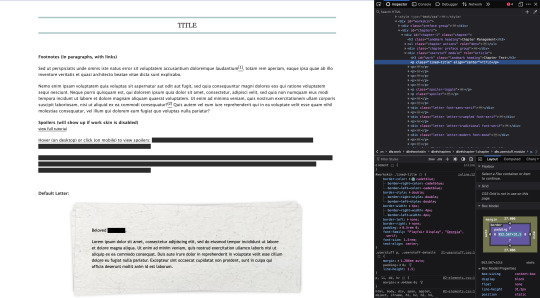
it might look different depending on the browser.
but here on the side, you can see the html on top and css at the bottom. as you can see in the screenshot, we are inspecting the title and we can see the different css rules for the title.
if you want to play around with the css, you can just change them from this panel and it will automatically reflect on the page. these changes are not permanent so it's a good way to test different styles without having to go through the cycle of updating the workskin and refreshing the fic page.
if this is your first time trying this out, it might look overwhelming, but it's very helpful if you get the hang of it. but of course, you don't need to learn how to do this to style your fics. :D
8 notes
·
View notes
Text
Character Flaws and Their Meanings
Impulsiveness : Acts on instinct without careful planning. Perfectionism : Sets unrealistically high standards, leading to self-criticism. Indecisiveness : Struggles to commit to decisions or choose a path. Arrogance : Overestimates one’s abilities and dismisses others. Pessimism : Habitually expects negative outcomes in most situations. Cynicism : Distrusts the motives and sincerity of others. Overconfidence : Places excessive faith in one’s skills, often underestimating risks. Stubbornness : Resists change and refuses to adapt to new ideas. Jealousy : Feels envious of others' success or possessions. Insecurity : Experiences frequent self-doubt and a lack of confidence. Procrastination : Tends to delay tasks, often leading to missed opportunities. Passivity : Avoids taking initiative and relies on others to act. Aggressiveness : Responds with hostility or force rather than reason. Selfishness : Prioritizes personal gain over the welfare of others. Fragility : Is overly sensitive to criticism and easily discouraged. Egotism : Constantly focuses on oneself and one’s own importance. Defensiveness : Quickly rejects or rationalizes away critique or new information. Manipulativeness : Exploits others to fulfill personal needs or desires. Recklessness : Shows a careless disregard for potential risks or consequences. Resentfulness : Holds lingering bitterness and grudges over perceived wrongs. Distractibility : Finds it hard to maintain focus amid competing interests. Impatience : Lacks the willingness to wait, often spoiling opportunities to learn. Perfunctory : Performs actions in a mechanical, uninspired manner. Self-Doubt : Consistently questions personal abilities and decisions. Arbitraryness : Makes decisions based on whim rather than reason or evidence. Rigidity : Is inflexible and unwilling to consider alternative viewpoints. Gullibility : Trusts too easily, often leading to being misled or deceived. Obsession : Becomes excessively fixated on particular ideas or details. Aloofness : Maintains emotional distance, appearing detached or indifferent. Intolerance : Refuses to accept differing perspectives or lifestyles.
Writing Advice for Brainstorming
Mix genres and time periods: Experiment by combining elements from different eras or genres to create unique settings and narratives.
Use "what if" scenarios: Pose unexpected questions (e.g., What if time travel operated on emotions rather than mechanics?) to spark novel ideas.
Draw from diverse mediums: Engage with art, music, or even scientific papers to inspire unexpected plot twists.
Embrace absurdity: Let illogical or surreal ideas guide you; sometimes the wildest thoughts lead to compelling stories.
Reverse clichés: Identify common tropes in your favorite genres and deliberately invert them to create fresh perspectives.
Incorporate personal anomalies: Transform your idiosyncrasies and personal struggles into rich, multi-dimensional characters.
Use mind-mapping: Visually plot your ideas in a freeform way to uncover hidden connections between disparate elements.
#writing#writeblr#on writing#writing tips#how to write#writers block#creative writing#writers and poets#thewriteadviceforwriters#writers on tumblr#writing project#fiction writing#novel writing#writing a book#writing advice#romance writing#writing characters#writing community#writing guide#writing inspiration#writing prompts#writing ideas#writing reference#writing blog#writing resources#writing help#writing software#writerscommunity#writers#writing tips and tricks
8K notes
·
View notes
Text
20 Alternative Losses Your Protagonist Can Face That Don't Involve the Death of a Person.
In one of my recent posts, I talked about losses as a core principle in driving a plot forward.

It's recommended in almost all guides. But here's the thing: someone doesn't have to actually die to create that emotional rollercoaster.
Here are 20 different losses your protagonist can face without losing someone to the cold hands of death:
1. Loss of a dream job opportunity
2. End of a long-term relationship or marriage
3. Betrayal by a close friend or family member
4. Financial ruin or bankruptcy
5. Loss of a beloved pet (The pet could go missing.)
6. Rejection from a prestigious program or institution
7. Injury or illness leading to the loss of physical abilities
8. Destruction of a childhood home
9. Loss of custody of a child
10. Failure to achieve a lifelong dream or goal
11. Being falsely accused of a crime
12. Natural disaster destroying personal belongings and home
13. Loss of a valuable family heirloom
14. Experiencing discrimination or injustice
15. Being forced to move away from a beloved community
16. Losing a significant competition or contest
17. Loss of memory or cognitive abilities
18. Falling out with a mentor or role model
19. Closure of a cherished local business
20. Loss of one's reputation due to scandal or rumor
Thank you for all of your support. If you love my blog, consider gifting me a rose. Val's here, and I hope your characters are ready to paint the town red.
Check out this printable template that helps you structure the nuanced parts of your plot you normally skip out on.
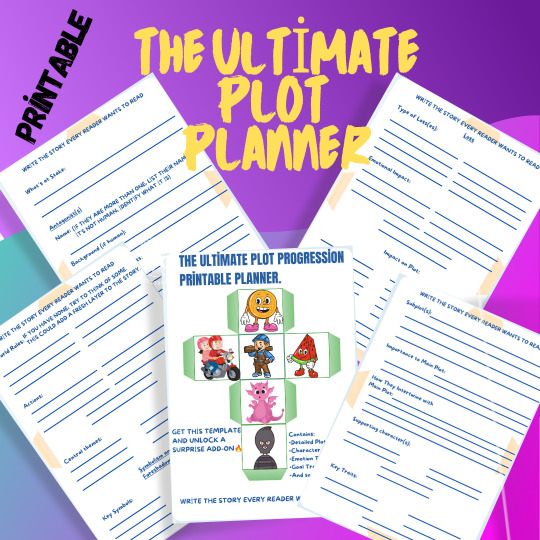
You also receive a free add-on that enhances your plot. It saves you time and helps you maintain quality.
#writeblr#writers on tumblr#writing#writers and poets#writerscommunity#writer#writing community#ao3 writer#wattpad#a03 writer#writers#writing prompts#writing guide#writing advice#writing reference#writing resources#writing habits#writing help#writing blog#writing techniques#writing template#writing tips and tricks#writing tool#writing tips#writing plot#plot problems#aspiring writer#writer and poets#writer blog#writer help
779 notes
·
View notes
Text
Fantasy Guide to Regency Fashion


The Regency. The King is mad, the Prince of Wales is lording it up as the de-facto head of state. Napoleon is raging in Europe, Jane Austen is Austen-ning and the Bridgertons are on the prowl, waiting for their glow-up season. But what are they wearing during this period? Now, for this post, I am focusing on the actual Regency period (1811 to 1820). The before and after will come… eventually.
The Regency is a curious sub-era of fashion because it is bracketed between the early Victorian era with its large skirts and large puffy sleeves and the Georgian fashions with the court mantuas. I once read an article that pondered what the Victorians thought of the fashion of their grandmother’s and great-grandmothers during the Regency, wondering if they were scandalised.
Undergarments

The Regency undergarments have much of the same structure of those that came before and after, just with tweaks.
For ladies, the Regency was a time for natural silhouettes, so this meant that the long-structured corsets of the Victorians were a way off and the panniers of the Georgians were forgotten (except at court but we will talk about it later).
Chemise: This goes under everything. This is not up for debate. I am talking to you period drama wardrobe people, yes you, you know who you are. The chemise is like a big linen shirt worn under everything else.
Petticoat: This was a thin skirt worn over the chemise to keep the chemise from sticking to the skirts. These weren’t worn for volume as petticoats were and would be worn.
Corsets: The Corset in the Regency period was much shorter than you would expect but so were bodices. Regency corsets might make you think of modern-day bras since they sometimes spanned from the breasts to the waist rather than the hips.
Stockings and garters: Stockings are like long socks that go up past the knee, usually in muted colours and embroidered. Stockings were held up by garters, which were strips of cloth tied around the leg to keep them in place.
Drawers: Technically most Regency women didn’t wear any underwear, but the Regency period was the beginning of the interest in wearing them. Some women adopted the drawers which were modified versions of the drawers worn by men. Princess Charlotte, Princess of Wales was said to have tried them out which confused a lot of other women. In the later years of the Regency, some women adopted the pantaloons which were like drawers only longer. Drawers were short of linen or cotton shorts, only with a split in the crotch and a drawstring waist.
Gentlemen
Undershirts: Men wore their own kinds of chemises, but these were much shorter and tucked into the drawers. You’re thinking of Colin Firth aren’t you?
Drawers: Like I said, the lady’s versions are adaptations of the men, cotton/linen shorts with a drawstring. But during the Regency, the drawers were adapted to have buttoned flaps.
Corsets: Yes, men also wore corsets. The Prince Regent wore one for his back issues officially but there were rumours of him wearing one to try manage his considerable weight.
Stockings and garters: Stockings are like long socks that go up past the knee, usually in muted colours and embroidered. Stockings were held up by garters, which were strips of cloth tied around the leg to keep them in place.
Gowns and Suits


The Gentlemen
The men of the Regency were just as interested in their fashion as their female counterparts and their predecessors of the Georgian period.
Tailcoat/Jacket: Jackets and tailcoats were tailored, with the tails shaped into a “M” shape. These were made to show the shirt, vest and cravat underneath.
Waist Coat: The Regency waistcoats were vests, usually single-breasted but double-breasted were popular too. The trend in the Regency was high collared vests.
Shirt: Men would have worn shirts over their chemise for warm, only this shirt would be of more substantial fabric and often embroidered.
Cravat: The cravat is like a tie, wrapped around the neck and knotted.
Pants: When not at court, men wore trousers. These were buttoned at the front and usually tailored.
Breeches: Breeches were worn more at court as they were considered old-fashioned.
Pantaloons: These were tight, fitted trousers that were worn with high boots.
Suspenders: Trousers worn with suspenders were originally a working-class trend – as all the best trends are – become popular in the years preceding the Regency.
Inexpressibles: Probably what you’re thinking of when you think of Regency pants. These were extremely tight fitting and have reputation.
Buckskins: These were sort of the equivalent of comfy pants for the men. They were made from deerskin and worn during down time.
Great Coat: The great coat is a long coat worn over the ensemble and could be as fancy or as plain as the gentleman wants.
Shoes: Usually, leather dress shoes and worn to every sort of event except outside where boots might be the best option. Boots were never worn at night.
Ladies
The women of the Regency period were experiencing something new, something more aligned to the Romanticism of the day. Women took inspiration from the Classical world in their fashion. Bodices became shorter, sleeves shorter and silhouettes less structured.
Morning Gowns: These were dresses worn in the morning or during the day time if one was staying at home. It had an empire waist, short sleeves and worn with shawls and bonnets if taking a stroll in the garden. These were usually made of light fabrics such as muslin or poplin
Visiting Gowns: Visting gowns were worn when calling on friends or family. They were made of more substantial fabric like wool, satin or silk and less plain than the morning gown. They would be long sleeved and worn with gloves.
Walking Gowns: Walking gowns are pretty much self-explanatory, worn when walking outside, so that means long sleeves. They were made of thick fabrics such as wool, cotton and velvet and always worn with a bonnet and a spencer or a pelisse and gloves.
Promenade Dresses: These are a fancier gown than walking gowns, usually more decorated and worn both for walking and for riding in a carriage. Worn with a bonnet and gloves. Usually worn when one is taking a quick trip by carriage.
Carriage Dresses: Yes, the Regency not only had one dress for riding in a carriage, they had many. These were very similar to the promenade dress but designed for better comfort. Can be worn with gloves but definitely worn with a bonnet. One might wear this one on long journeys by carriage.
Riding Habits: This was worn by women when they were riding horses. They were usually made of thick cotton, leather of wool depending on the weather. This outfit was comprised of a long coat, riding gloves, high boots for the muck and stirrups and worn with a hat to keep the hair from the lady’s face.
Ball Gowns: Ball gowns were short sleeved, empire waisted and made from silk, satin and usually well decorated depending on the lady’s rank. They were always paired with long gloves. No bonnet worn here. Hair would be arranged under a tiara or an array of flowers or jewels or combs.
Shawl: Was a drape of fabric worn over the upper body against a chill. It may be made from wool or a heavier fabric but if worn to an event, it would be made of lighter fabric.
The Spencer Jacket: The Spencer is a fitted jacket, long sleeved and waist-length jacket worn over a dress when walking.
Pelisse: Is an coat dress which like the Spencer was close fitting but it was much longer.
Cloak/Mantelet: The cloak wasn’t dead yet in the Regency period. Women would have worn them in the evenings when attending balls, parties, the opera and the theatre.
Tucker: The tucker was a piece of fabric tucked into one’s bodice to cover as much as one’s chest and shoulders as possible.
Bonnet: The bonnet was usually a cap with a wide brim, trimmed with fabric flowers or ribbon and held in place by a ribbon tied under the chin.
Slippers: These look like a ballet slipper. They would be made from silk, satin, leather etc.
Boots: These were made of leather, often worn when walking distances in the city and country and usually only reached the ankle.
Pattens: This was a metal lift worn at the bottom of the lady’s shoe to keep her from ruining her shoes in rain or the city’s muddy streets.
When at Court

If you have ever watched Bridgerton, you might see that Queen Charlotte doesn’t wear the same gowns as the rest of the ton. This is actually historically accurate as Queen Charlotte was a traditionalist at heart and distrusted the new fashions, though we have a surviving empire-waisted dress of hers worn in private. When the ton descended on court, especially at the debut, they would not be wearing their short-sleeved, empire gowns. They would be wearing a wide hooped dress with a long train – but the Regency ladies weren’t about to give up on everything modern, they followed Queen Charlotte’s rules but kept the empire waist which lead to a ridiculous looking gown. I mean, look at it.
Bejewelled


The Regency era is a very important era for jewels because *trumpet sounds* it was the dawn of the tiara, or the renaissance of it. The modern idea of tiara came about during this era due to the women taking inspiration from the stephanes worn by the Ancient Greeks and Romans. Tiaras became a staple during this time, giving us some of our most famous and beautiful tiaras we still have today.
#I thought ye would like this one#The regency#fantasy guide to regency fashion#regency fashion#empire waist gown#writing#writeblr#writing resources#writer's problems#writer#writing advice#writing reference#spilled words#writer's life#historical fiction#bridgerton#jane austen#pride and prejudice#writing help#writing inspiration#creative writing
660 notes
·
View notes
Text
WWC’s A Beginner’s Guide to Academic Research
We are pleased to present WWC’s A Beginner’s Guide to Academic Research!
This pandemic project has been over 2 years in the making and we hope it will greatly assist any of our readers who are eager to conduct in-depth research but may be at a loss where to start.
Go to the Guide Here
The guide is split into 6 parts:
Introduction and Table of Contents
Part 1: Getting Started
Part 2: Searching for Sources Online
Part 3: Evaluating Sources
Part 4: Navigating Academic Sources
Part 5: Recognizing Your Limits
Each portion of the guide has links to connect to the previous and next sections. While it is possible to view tumblr pages on phones and tablets through the app, we highly recommend viewing this guide via browser on desktop whenever possible. Tumblr page formatting is better suited for browsers and each section is very dense with information, which will make scrolling in the app or on your dashboard difficult.
Future FAQ/ Discussion:
As noted in part 5 of the guide, for the next two weeks, we will be keeping an eye on the notes for this post. If you have further questions or comments about academic research, drop them here and we will select the most pertinent to respond to in a later post.
If you find this guide helpful, we request that you consider tipping the moderators below for the work and time required from conception, to drafting, formatting and debugging. Their ko-fis are listed below:
Rina: https://ko-fi.com/arcanabean
Marika: https://ko-fi.com/5h1njuu
5K notes
·
View notes
Text
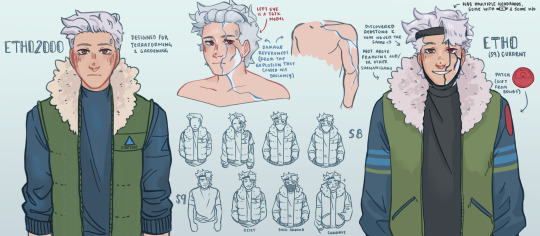
Finally: The Official DBHC Etho Reference Sheet!
I had to clarify that the “current” look is for Season 9, because I’m not sure how or if he’ll change for s10 yet! The “current” version is essentially his updated “default” look! Thought I might mention also that “Back Around” on the loose timeline lineup at the bottom is a reference to a song on his playlist in which he takes some time away from everyone after re-deviating to re-remember and find himself <3
Side note: Etho wears his mask under his chin mostly just around bdubs, but he starts wearing it down more often around doc, tango, or others who are used to seeing the damage. More than anything else, he’s sure to keep it for protection purposes when he’s outside working, exploring, or anything else that isn’t just hanging and chatting with friends :]
#dbhc ref#I’ll be putting all of the official character references and the Android guide under that tag btw!#dbhc#dbhc etho#dbhc art#ethoslab#hermitcraft au#hermitcraft#hermitcraft dbh au#etho#art escapades#VERY EXCITED TO SHARE THIS#this had been sitting in my folders finished for a while but I had to add a bunch of little notes that I forgot to initially!!!#IT WAS WILD DRAWING PRE-DEVIANT ETHO AGAIN THOUGH I miss him#not really but. yknow#I might make a note later about little changes that happen after destruction because I imagine doc and xisuma try very hard to#restore the cracks as close as they can but it’s not Perfect#BUT ANYWAY#YIPPE ETHO REF SHEET#character ref sheet#Android etho
2K notes
·
View notes